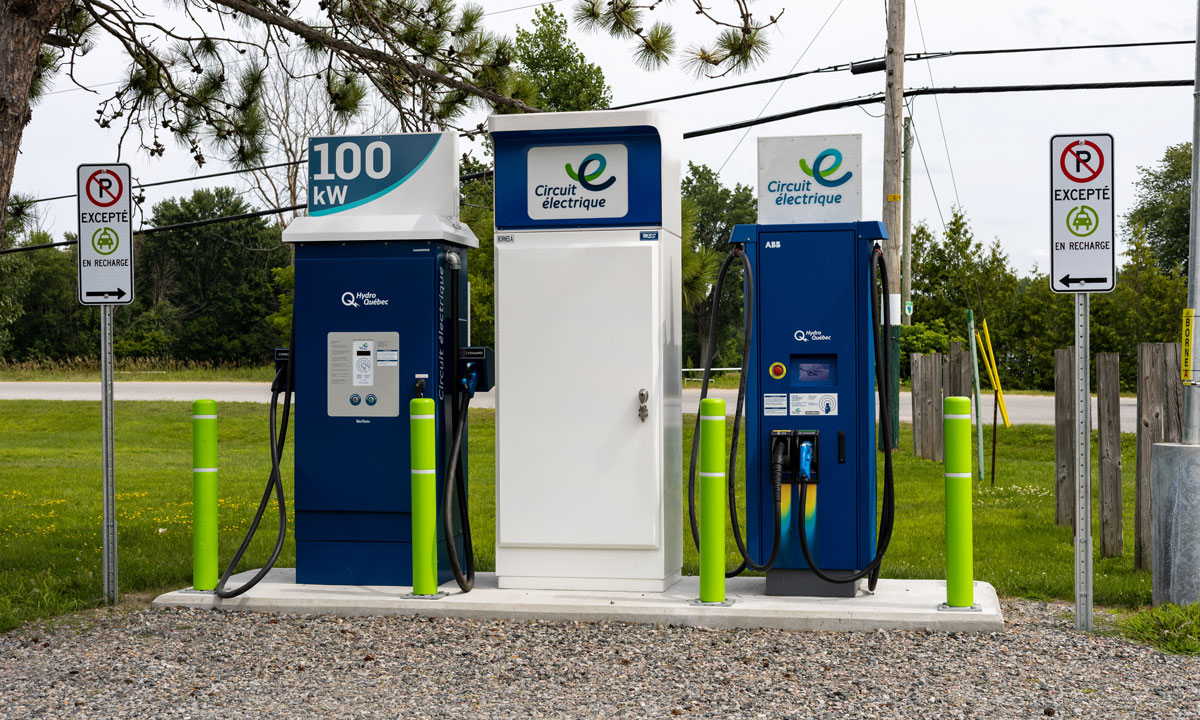
There will soon be more charging locations than gas stations. Imagine that.
While the past two years have been a rollercoaster ride for the automotive industry as a whole, there is one corner of the industry where things have been moving constantly “up and to the right”: public EV charging deployment.
Here’s a look at the current state of EV charging in Canada and how things have progressed despite the pandemic.
(All statistics are taken from the ChargeHub.com database)
As of early 2022, there were 18,842 charging ports deployed in about 7,500 locations in Canada. These include 15,718 level 2 (240 V) ports and 3,784 DC Fast Chargers (DCFC).

When comparing these numbers with the beginning of the pandemic, we see a growth of more than 42 per cent in the number of public charging ports over this two-year period. This increase wasn’t equal in 2020 and 2021. There were almost 900 more new ports deployed in 2021 when compared to the first year of the pandemic (2,367 and 3,225 new ports in 2020 and 2021 respectively).
When looking at how these ports were distributed between level 2 ports and DCFC ports we see that a growing percentage of the ports being deployed in Canada are DCFC ports.
In 2020, there was one DCFC port deployed for every five (5) level 2 ports deployed during the year.
In 2021 that ratio increased to one DCFC port deployed for every three (3) level 2 ports deployed during the year.
The numbers don’t lie, EV charging deployment is increasing at a rapid rate in Canada, and a growing share of the stations being deployed are fast chargers. This is great news for all the EV buyers who will be receiving their cars thisyear after having waited for a prolonged period due to various supply chain issues.
The numbers don’t lie, EV charging deployment is increasing at a rapid rate in Canada, and a growing share of the stations being deployed are fast chargers.
Similarly to the auto sector, EV charging equipment is not immune to supply chain issues, however most deployment projects are planned many months and often years in advance. Therefore, thus far there hasn’t been a major negative impact in deployment numbers in Canada due to supply chain issues.
There were signs of EV charging equipment supply chain issues later in 2021 however this did not affect the 2021 deployment since most of the deployment is done in the warmer months of the year.
It will be interesting in the coming months to see if supply will be sufficient for all the planned projects in each and every Canadian province and territory in 2022. If there are no supply issues in 2022 and the yearly increase in deployment rate continues to increase at the same pace, we could have close to 25,000 public charging ports in Canada by the end of the year.
This possibility points to a major milestone around the corner in the transition from fossil fuels to electric power.
According to the Canadian Fuels Association, there are 11,908 retail gasoline stations in Canada and this number is on the decline.
At the current ratio of charging ports per location, this means that some time next year there will likely be more public EV charging locations in Canada than gasoline stations.
Most non-EV drivers don’t realize the extent of Canada’s public charging deployment and many still have “range anxiety” when thinking about possibly owning an EV in the future.
With the extent and the growth rate of Canada’s public charging network, however, this fear is, in most Canadian regions, a perception issue based upon the lack of knowledge about the true state of public charging deployment.
Canadian dealerships can gain from having a strong sense of the current state of EV charging deployment in order to reassure potential EV buyers with range anxiety.
Those wanting to visually see the extent of public charging can visit ChargeHub.com’s free public EV charging map at (chargehub.com/map) and, when useful, share this information with their prospective buyers who are not well informed on the extent of locations with public charging stations in Canada.




